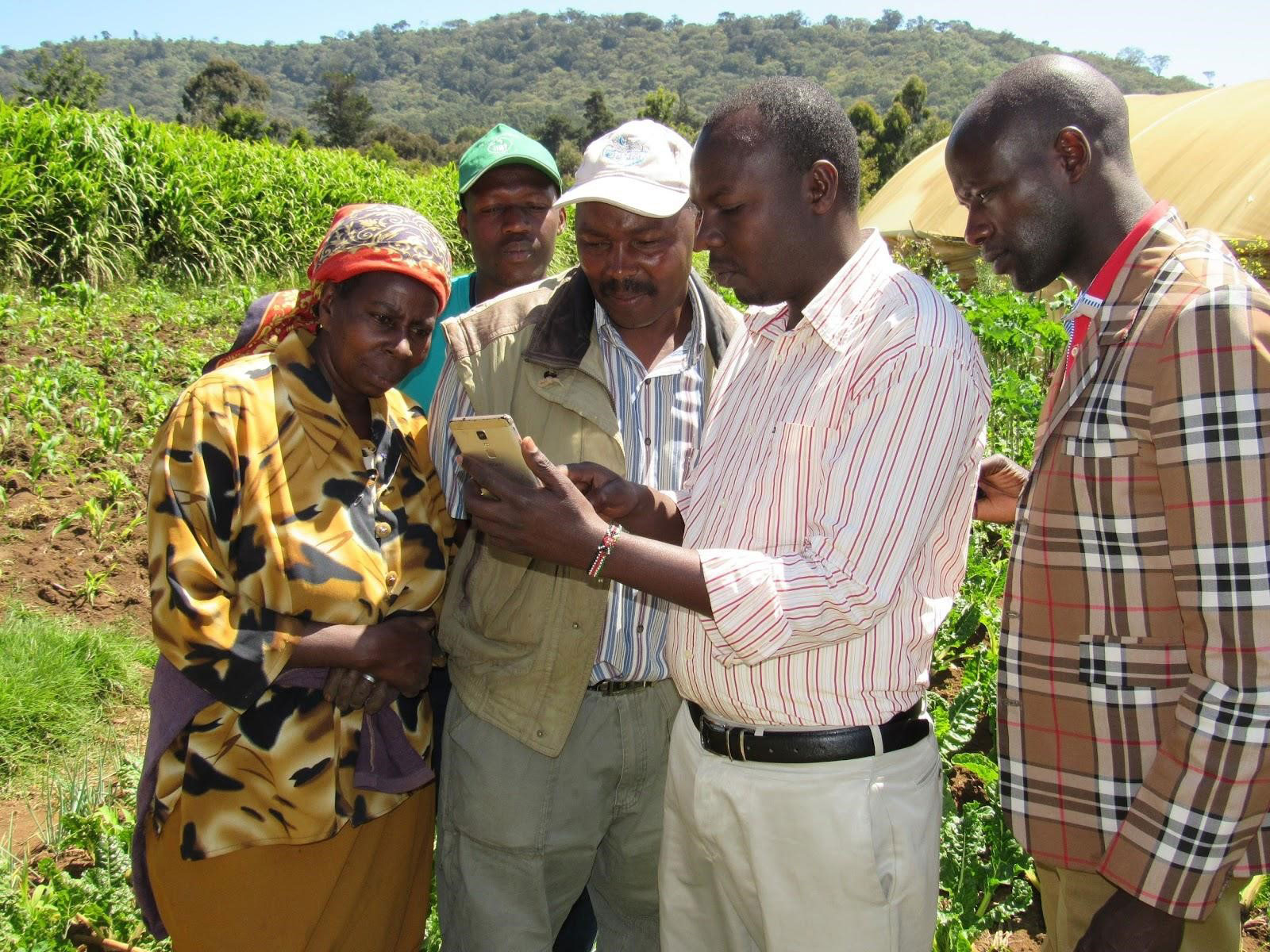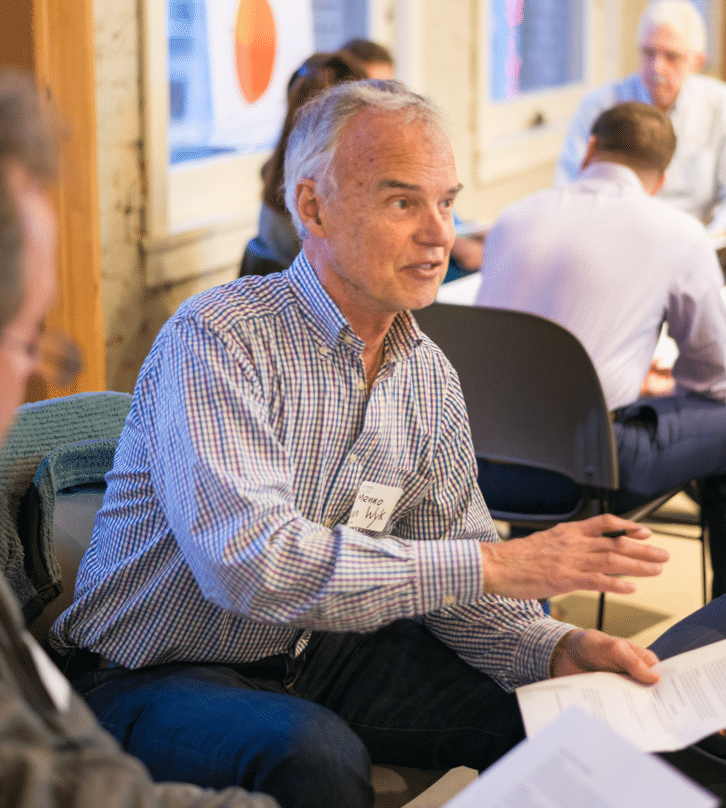In 2011 a farmer-led organization based in London called Producers Direct launched Wefarm, the world’s first digital networking service designed by and exclusively for smallholder farmers in sub-Saharan Africa. The idea was to create a sort of crowdsourcing platform whereby farmers could share information, ideas, and tips over even simple text messaging systems on their mobile phones. “It’s a peer-to-peer knowledge sharing service available by SNS,” Sarah Mackay, the head of fundraising and partnerships at Producers Direct, explained in an interview with Grow Further. Wherever there’s a cellular phone connection, Wefarm works, and the system is light enough to be useable on even late-model phones and without eating too deeply into users’ mobile data, meaning farmers can access Wefarm in their fields liberally and without hurting their wallets too hard, or even at all. It was originally rolled out for the benefit of smallholder coffee and tea farmers in Kenya. Producers Direct considers it their most successful and influential innovation to date, as Mackay explained.
She was being modest.
Kenya-based Wefarm is now considered one of Africa’s most savvy and innovative tech and social media enterprises. Internet search giant Google awarded Wefarm with its 2014 Google Impact Challenge Award, an honor that comes with both bragging rights and a huge cash prize. With that prize money, Producers Direct set Wefarm loose on its own as an independent company in 2015, and investors quickly took notice. “They’ve raised, I think, $30 million in venture capitalist funding,” Mackay added. “They’re reaching 2 million farmers across East Africa” (https://about.wefarm.com/).
What will Producers Direct’s next big move in innovation look like? Mackay said it’s up to the farmers, including the organization’s farmer board members and the smallholder farmers it partners with. Whatever shape it takes, the next initiative will be based entirely on what smallholder farmers themselves say they need, she insists, and how those needs can be met and new and creative ways. “We’ve kind of embraced innovation, so thinking about how to do things differently,” Mackay emphasized.
Roots in the Fair-Trade Movement
Producers Direct traces its roots back to 2009 when Cafedirect, a coffee and tea distributor in the United Kingdom, sought out a way to deliver more benefits to the smallholder coffee and tea farmers who form the backbone of its business. The company formed an associated nonprofit called the Cafedirect Producers’ Foundation. Through this foundation, Cafedirect eventually transformed itself into the U.K.’s largest fair-trade coffee and tea distributor (https://producersdirect.org/).
By 2011 the Cafedirect Producers’ Foundation was involved in more than 90 projects designed to improve the lives and livelihoods of smallholder farmers in Africa and Latin America. Its activities have been expanding ever since. By 2018, the year the Cafedirect Producers’ Foundation rebranded itself as Producers Direct, the organization was reaching in some way over half a million smallholder farmers. It\’s a good start, but not their ultimate goal, Mackay said. “Our core ethos, our mission, is to improve the livelihoods of over 1 million smallholder farmers across East Africa and Latin America,” she told us. “And that\’s really, really focusing on working in partnership with smallholders themselves not only to identify the challenges they\’re facing but to design the services and deliver the services to help those farmers overcome challenges.”
“A lot of our focus is on resilience and certification.”
Striving for Excellence
Today, Producers Direct runs several “Centers of Excellence” that serve as training hubs for smallholder farmers in Africa and Latin America. Their most recently launched center is based in Peru. The organization continues to specialize in finding solutions to improve the lives of coffee and tea farmers. That means, for starters, helping those farmers produce quality crops that can compete in an increasingly crowded marketplace. “Some of the training is on coffee quality and tea quality and improving production, so kind of the standard stuff,” Mackay explained. “But a lot of our focus is on resilience and certification.” When they first started, organizers began by asking the farmers themselves what they most needed. Information and training both topped the list, thus the birth of Wefarm and the Centers of Excellence training hubs. A lack of finance is another complaint, so Producers Direct is now seeking to develop innovative solutions to this common problem as well.
“We’re particularly trying to reach women, we’re particularly trying to reach young people.”
At the time of our interview, Mackay said she was busying herself trying to understand blockchain technology, as her organization has in mind a type of blockchain-backed credit rating system for smallholder farmers that might help them win bank lending. The concept, currently dubbed Microtask, would see participating farmers earning credits or tokens for completing specific types of training. The training tokens would be the core of the rating system: the higher the number of tokens or credits earned and logged into the system, the higher a farmer’s “credit score” to show a bank that they’re dealing with a credible, competent businessperson. Mackay said Microtask would become a means to “incentivize all sorts of behaviors, to demonstrate that that farmer would make a could lender,” she explained. “How farmers can vouch for each other.”
A Light at the End of the Tunnel
As with everything and everyone, Producers Direct has also been hit hard by the worldwide COVID-19 pandemic. “Access to markets became really, really hard, particularly in the height of COVID when everyone was locked down and all the markets were shuttered,” Mackay said. Their smallholder farmer partners are primarily tea and coffee farmers, and tea and coffee farmers rely primarily on overseas consumers to market and sell their products to. COVID-19 not only shut borders but also closed coffee and tea shops. As economic activity is now returning to the world’s largest coffee and tea drinking populations, prospects for Producers Direct’s farmers are starting to turn a corner as well. The struggle is far from over, but “I think people are starting to see the light at the end of the tunnel,” she said.
Producers Direct is already making ambitious post-COVID plans, Mackay noted. “The theme at the moment for us is harnessing the power of data,” she explained. “Farmers tend to live in the middle of nowhere and they tend to share quite a lot of data with people, but they never really benefit from it. So we’re playing around at the moment with some gamification and incentivization to where farmers share some data with us digitally, and then they can get insights which are useful for them back—things like yield prediction.”
As with Wefarm and the forthcoming blockchain-based credit rating tool, digital is key. Though the organization aims to benefit the lives of 1 million farmers directly, it laid out a goal to reach 1.7 million of them digitally by 2024, and with an added emphasis on women farmers and their needs in particular. “The member of the producer organization tends to be a man,” she noted. “We’re particularly trying to reach women, we’re particularly trying to reach young people who tend to fall through the gaps of some of those standard services, like extension services.”
Inclusive innovation for lifting up smallholder farmers, especially women and youth—that\’s an ethos that Grow Further and any other organization committing to improving the world\’s agriculture can get behind.
— Grow Further
Photo credit: Wefarm demonstrated in the field. Producers Direct




